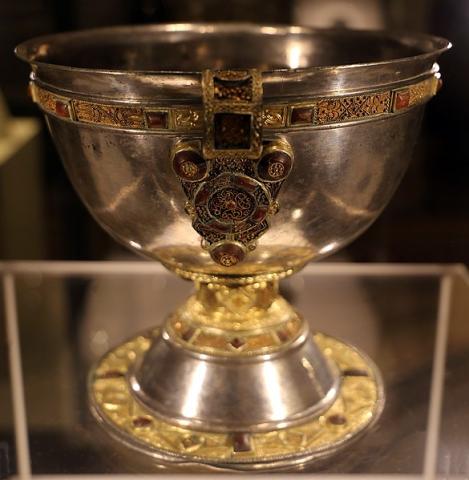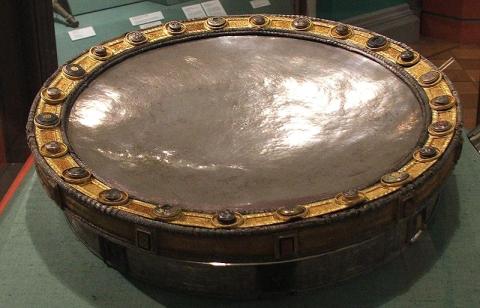[15] Quārtō autem diē invēnērunt calicem dē genere cōnōpēī et patēnam dē colōre columnae, iacentēs in quādam fenestrā in latere columnae contrā austrum. [16] Quae statim vāscula sānctus Brendānus apprehendit, dīcēns: “Dominus noster Iēsus Chrīstus ostendit nōbīs hoc mīrāculum, et, ut ostendātur multīs ad crēdendum, mihi dēdit ista bīna mūnera.” [17] Statim praecēpit vir Deī frātribus dīvīnum officium peragere et posteā corpora reficere, quia nūllum taedium habēbant dē cibō sūmere aut pōtū postquam vidērent illam columnam.
[18] Trānsāctā vērō illā nocte, coepērunt frātrēs nāvigāre contrā septentriōnem. [19] Cum autem trānsiērunt quoddam forāmen, posuērunt arborem et vēla in altum, et aliī tenēbant ex frātribus fībulās cōnōpēī quōusque omnia praeparāssent in nāvī. [20] Extēnsīs vēlīs, coepit prōsper ventus post illōs flāre, ita ut nihil illīs opus fuisset nāvigāre nisi tantum tenēre fūniculōs et gubernam. [21] Sīc ferēbātur per octo diēs nāvicula contrā aquilōnem.
notes
On the fourth day, in a kind of window on the fourth side, they find a chalice, made from the same material as the net (silver but harder than marble), and a paten, made from the same material as the pillar (crystal). Brendan says that this is a miracle, sent by Christ to confirm their faith. They conduct Mass, have a meal, and then sail out through the net. A favorable wind drives them north.
[15] invēnērunt calicem dē genere cōnōpēī et patēnam: the pillar is now like an altar, prepared for Mass (Holy Communion) with a silver chalice and paten (dish) for the wine and bread.
[16] Quae statim vāscula sānctus Brendānus apprehendit = Quae vāscula sānctus Brendānus statim apprehendit.
ut ostendātur multīs: perhaps a reference to relics kept at Clonfert.
[17] dīvīnum officium: presumably the Mass.
nūllum taedium habēbant dē cibō sūmere aut pōtū: either" they had no weariness (requiring them) to take (something) of food or drink” or “they had no time to take food or drink.”
[18] coepērunt frātrēs nāvigāre: they started by rowing, as we infer from the next sentence.
[19] trānsiērunt: we might have expected trānsiēbant; as we will see, crossing the opening took some time.
in altum: “on high.”
aliī tenēbant ex frātribus: = aliī ex frātribus tenēbant. CL would be quīdam fratrum; see 22.6.
quōusque omnia praeparāssent in nāvī: while there were getting ready to sail; CL would be praeparārent.
[20] ut nihil illīs opus fuisset nāvigāre: here nāvigō is clearly “row.”
vocabulary
|
calix –icis m. |
cup, goblet, chalice15 |
|
cōnōpium –(i)ī n. |
net (ML; CL cōnōpēum, ī, n.: mosquito net) |
|
patēna –ae f. |
paten used for the Mass (ML; CL pan, shallow dish) |
|
columna –ae f. |
column, pillar |
|
fenestra –ae f. |
window |
|
columna –ae f. |
column, pillar |
|
contrā |
against; towards, in the direction of (OLD 14a) |
|
auster –trī m. |
the south wind; the south |
|
vasculum (vāsculum) –ī n. |
small vessel or container; jar16 |
|
apprehendō apprehendere apprehendī apprehēnsum |
to take hold of |
|
Iēsūs –ū m. |
Jesus (Christ) |
|
Christus –ī m. |
Christ |
|
mīrāculum –ī n. |
a marvel |
|
bīnī –ae –a |
2 by 2 |
|
dīvīnus –a –um |
divine17 |
|
peragō peragere perēgī perāctum |
to finish |
|
reficiō reficere refēcī refectus |
to restore, revive (transitive) (ML) to take food, eat (intransitive) |
|
quia |
because; that |
|
taedium –ī n. |
leisure, slack time; weariness; disgust, aversion |
|
pōtus pōtūs m. |
a drinking, a drink |
|
columna –ae f. |
column, pillar |
|
trānsigō trānsigere trānsēgī trānsāctum |
to carry through, complete; to spend, pass18 |
|
nāvigō nāvigāre nāvigāvī nāvigātus |
to go by ship, sail; to row |
|
contrā |
against; towards, in the direction of (OLD 14a) |
|
septentriōnes –um m. |
the north (wind, stars) |
|
forāmen –inis n. |
aperture, hole, cavity |
|
vēlum vēlī n. |
sail; curtain; cloth |
|
altum altī n. |
the deep, the sea; a high place (in the sky) |
|
teneō tenēre tenuī tentus |
to hold, keep; to reach in journeying, make (OLD 5a) |
|
fībula –ae f. |
bolt, bar, pin; the meshes of the net |
|
cōnōpium –(i)ī n. |
net (ML; CL cōnōpēum, ī, n.: mosquito net) |
|
quoūsque or |
as long as (OLD 2) |
|
praeparō –parāre –parāvī –parātus |
to prepare, make preparations |
|
extendō –ere –tendī –tentus |
to stretch forth; stretch19 |
|
vēlum vēlī n. |
sail; curtain; cloth |
|
prōsper or, more frequently, |
(of winds) favorable |
|
flō flāre flāvī flātus |
to blow |
|
nāvigō nāvigāre nāvigāvī nāvigātus |
to go by ship, sail; to row |
|
teneō tenēre tenuī tentus |
to hold, keep; to reach in journeying, make (OLD 5a) |
|
fūniculus –ī m. |
a slender rope, a cord |
|
guberna -ae, f. |
helm; rudder (ML; CL gubernāculum, ī, n.) |
|
per |
through; by means of (OLD 14)20 |
|
octō; octāvus –a –um |
8; 8th |
|
nāvicula –ae f. |
boat (ML); (CL) small boat |
|
contrā |
against; towards, in the direction of (OLD 14a) |
|
aquilō –ōnis m. |
the north wind; North |


